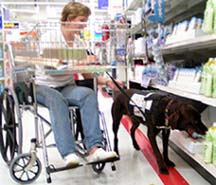 |
Major helping by getting an item
|
Service Dog Benefits
Someone who is physically challenged knows the difficulty that can be found in every day tasks that most of us tend to take for granted. For those dealing with the day-to-day challenges of life with a disability, a custom trained Shore Service Dog can be of enormous assistance in helping them to achieve a greater level of mobility and independence.
Some of the benefits of a Service Dogs are:
24 HOUR COMPANION
Service dogs are with their partners constantly. It's basically like having a helper 24 hours a day!
SELF SUFFICIENCY
The disabled individual has less need for asking others to assist with tasks. This is not only practical in many situations, it has the emotional benefit of conquering the feelings of hopelessness and imposition that a person can feel having to ask for help over and over.
LESSENED CAREGIVER COSTS
There is less need for a human caregiver to assist with chores around the house or to perform tasks such as shopping, etc. These dogs are trained to assist with many task and are adaptable to learn how to deal with unfamiliar duties their partner might need assistance with.
PERSONAL SECURITY
While Service Dogs are not trained for protection since they need to be well mannered and nonagressive in public, they do discourage aggressive advances from others and can act as guardians to their partners (particularly in cases of seizure victims).
DELAYS DETERIORATION
Exercise is well known to ward off the effects of aging and degeneration of muscle tissue and bone mass. The day to day interaction needed to take care of a dog, assists the individual to keep active and involved with staying healthy. Even the simple action of throwing a ball in a game of fetch is exercise that helps both canine and human to keep in shape.
BACK TO TOP
PHYSICAL THERAPY
Dogs provide many opportunities for exercise: grooming them, throwing a ball or frisbee, playing tug games, etc. All of these help keep their human partner moving and staying limber. Many times a person will push themselves to strive harder for their dog than they'd ever do just for themselves. In quite a few cases, these special canines are also trained to assist with a structured physical therapy exercise such as lying across legs to give balance for sit-ups or providing a brace for the partner to use while walking or transferring from a wheelchair.
PSYCHOLOGICAL BENEFITS
No matter how rotten a day has been, these special dogs provide affection during those hard times and offer unconditional love and support. So often a person with a disability will put on a brave front but inside will be in pain, scared, depressed, frustrated, angry, or just plain exhausted with dealing with the effects of their disability. Having their canine partner there, giving them both physical and emotional support can make the difference between a tolerable day and one where you just want to give up.
SOCIAL BENEFITS
Many times individuals with disabilities experience isolation and in some instances, outright shunning because others feel uncomfortable with how they should act around them. Unknown circumstances can be scary and humans are notorious for avoiding situations where they don't know what to do or how to act. Having a Service Dog helps to bridge that uncomfortable barrier. Where someone would feel they couldn't possibly ask how a person deals with their disability, they're easily able to show an interest in how the dog helps their partner. This increased social interaction greatly lessens the isolation and feelings of being alone that the disable individual must cope with every day. As one partner once said “my dog makes my wheelchair disappear”. That pretty much says it all, right there.
 |
|
|
|